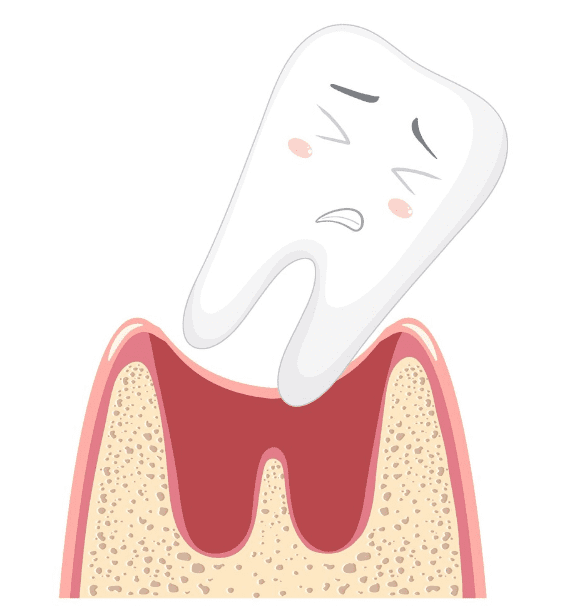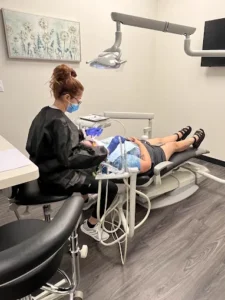Are you wondering how to tighten a loose tooth at home? When you have a loose tooth, particularly in adulthood, the first thing that comes to mind is there has got to be something wrong with your teeth. It is a normal occurrence to have loose teeth in children as their primary or baby set of teeth give way for the permanent ones, but if you are an adult and your teeth start shaking, it should be taken seriously. In this blog post, we go over why your teeth may become loose, what you can do to fix that at home, and offer advice on good dental hygiene. We will also detail professional treatments for those who experience more severe cases.
Loose Teeth – Determine the Causes
When your ligaments and bone begin to pull away from each other, a tooth can feel loose. The key to solving the problem is knowing the root cause.
Most Common Reasons for Loose Teeth
- Gum Disease (Periodontitis)
Gum disease, especially periodontitis, is the most common factor that triggers loose teeth risk in adults. The infection destroys the gums and periodontal ligaments, causing the teeth to become loose. - Plaque Buildup
Gum recession allows plaque accumulation around the teeth, creating pockets where bacteria can survive. That weakens the bone and tissue that support your teeth over time. - Teeth Grinding (Bruxism)
Bruxism or teeth grinding and clenching, especially during sleep, adds pressure onto your teeth, causing mobility. - Trauma or Injury
Accidental or facial trauma results in a dental injury that can break or injure the tooth and jawbone, causing tooth loss. - Poor Oral Hygiene
Poor oral hygiene leads to tooth decay, gum disease, and bacteria that can cause loose teeth. - Osteoporosis
Osteoporosis, a disorder that reduces bone density, leads to an increased susceptibility of fractures. This affects the teeth-support bones, making them loosen. - Hormonal Changes
Hormonal changes during pregnancy loosen the ligaments surrounding the teeth. This often goes away after pregnancy, but it still needs to be treated.
Loose Teeth – Home Remedies
While in some cases professional treatment is required, there are several home remedies that can help strengthen loose teeth and enhance oral health. Simple though they may be, these remedies can still make a big difference in preventing damage from becoming worse.
1. Maintain Proper Oral Hygiene
Strong teeth and gums need proper oral hygiene. A few steps you can follow:
- If you want to eliminate plaque and bacteria, brush your teeth twice daily with fluoride toothpaste.
- By flossing every day, you dislodge food stuck between your teeth.
- Rinse your mouth with an antibacterial mouthwash to stop bacteria from flourishing.
- Drink acidic beverages through a straw to minimize direct contact with your teeth.
2. Nutritious Diet
Diet has a huge effect on the health of your teeth. Try incorporating the following into your meals:
- Dairy products, leafy greens, and almonds provide key calcium needed for strong teeth and bones.
- Fish and fortified cereals are sources of Vitamin D that help in calcium absorption for healthier teeth.
3. Saltwater Gargle
Warm salt water will help clean your mouth, reduce inflammation, and support the gums. Salt Water flushes out bacteria underneath the gums and helps strengthen loose teeth.
4. Hydrogen Peroxide Rinse
Mix water with some hydrogen peroxide and rinse your mouth gently to get rid of bacteria around a loose tooth. Infections can be prevented, and the risk of further damage is reduced.
5. Turmeric and Black Pepper
Turmeric, a natural antioxidant, and black pepper combine to calm inflammation while banishing bacteria. Gently massage it into the gums around the tooth, then rinse your mouth.
Preventing Enamel Erosion
Enamel, the outermost layer of your teeth, plays a big role in keeping teeth strong. Keeping your enamel healthy can help slow down loosening of your teeth. Here are some tips:
- Curb spicy foods and acidic fruit juices such as orange juice or sodas.
- Drink plenty of water to keep your mouth lubricated.
- Chewing sugar-free gum stimulates the production of saliva, which helps protect your enamel.
- If you have sensitive teeth, opt for fluoride toothpaste as it will also help strengthen enamel and reduce decay.

Professional Loose Tooth Treatments
If nothing seems to be working, one should immediately go for professional dental treatment instead of wasting time. The treatment depends on how severe the condition is, and your dentist may suggest any of these treatments:
1. Scaling and Root Planing
Gum Disease: By cleaning plaque and tartar below your gum line, deep periodontal scaling can aid in fighting off disease and supporting wobbly teeth.
2. Medications
Infections can be treated with appropriate medications (e.g., antibiotics) in cases of bacterial infections that contribute to the loosening of teeth.
3. Surgery
Surgery may be necessary to extract inflamed gum tissue in more critical cases or perform bone grafts to help support the teeth.
4. Dental Appliances
Dentists will advise a dental splint, which bonds the loose tooth to nearby teeth, allowing healing time.
Conclusion
Home remedies to tighten loose teeth involve regular oral care and appropriate dietary changes. Although you can get some relief from home remedies such as saltwater gargling, turmeric, and proper brushing techniques, it is crucial for a dentist to diagnose the underlying issue, whether it’s gum disease or trauma. These conditions may develop and cause further complications down the line if left untreated.
Schedule an Appointment
Remember, a loose tooth can lead to bigger dental problems if not treated. If you show symptoms of loose teeth or have problems with your gums, schedule a visit with your dentist as soon as possible. Celebrate Dental is your top choice for loose tooth treatment and management of other oral issues. Call [(512) 521-7000] or click to schedule a consultation with our team of dental professionals today. We want to help you maintain a strong, healthy smile!








